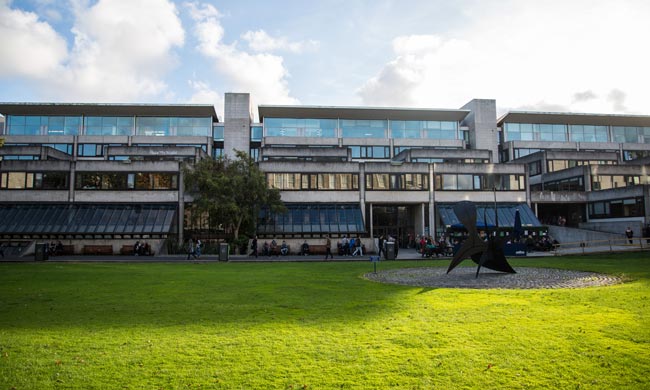There’s something upsetting about Trinity’s Arts Block. Sleek, modern buildings like the Hamilton and the Naughton slink their way across the bottom of our grounds, giving way to the glass-fronted giant that is the Sports Hall. Grand, imposing colossi of pillar and stone border our courtyard, broad and intimidating. Rows of windows sit in their classic redbrick frame behind the campanile, the orderly stone and glass ranks of the Old Library their good-looking neighbour.
Opposite that, though? There’s… well, there’s the Arts Block. Frankly speaking, the building is grim. Several staff members who work in the block have recently spoken about the “inadequacy” and “overcrowdedness” of it, calling the building “shabby” and “unhygienic”.
A quick glance at the 40-year old structure confirms their worries in seconds. Grey and malformed, with what look like streams of grimy tears dripping from bleak windows onto its squat visage, the neglected Arts Block provides striking visual proof of how the humanities are seen not just in Trinity, but in broader society, too.
Grubby and chronically underfunded, it’s hard to imagine a more appropriate home for the humanities than our Arts Block
If you’ve so much as expressed an interest in an arts degree, you’ll be familiar with some of the rhetoric surrounding it. Eyes are rolled. Comments about McDonalds are made. “An Arts degree”, wrote novelist J G Ballard, “is like a diploma in origami. And about as much use”.
Apps that teach children to code, Leaving Certificate incentives for higher-level maths and the undeniable appeal of vocational learning mean that the golden child of academia, STEM, has become as revered as the humanities are vilified. Arts degrees have become that disappointing building tucked behind the courtyard, the obscured and shameful structure made all the more hideous by the beauty of its better-loved siblings.
If this is how the arts are thought of, then it makes sense that the building they’re taught in should reflect their supposedly lower status. Grubby and chronically underfunded, it’s hard to imagine a more appropriate home for the humanities than our Arts Block.
How bizarre, then, to think about Trinity’s reliance on its humanitarian history. Statues of writer Oliver Goldsmith and philosopher Edmund Burke stand at the entrance to College, with a pride that can only be the result of having their backs turned to the Arts Block. The Book of Kells is prized as a point of status and culture, and also as a commodity. It draws sometimes stifling lines of paying tourists to the walls of the Old Library – walls more pristine and better-kept than any part of the building from which so much vital analysis about that beloved book came.
It’s almost ironic. Just as so many of the dazzling technological advances that take advantage of linguistics, design, ethics, translation and more are read as products of STEM alone, so Trinity relies on the glittering gems of the humanities while failing to properly credit and support the discipline itself. It might be gloomily fitting that the Arts Block is forced to look bleakly across that green grass to the mass adoration of art and history and culture, while suffering from the dismissal of those who study them.
Philosophical and ethical questions are becoming more, not less, relevant as new technologies change so many world views and human experiences
Despite some underfunding and a less than enviable public image, though, the humanities are nonetheless proving themselves as important and relevant as ever. Subjects like the digital humanities combine literary, philosophical, historical and linguistic expertise with the knowledge of computer scientists and mathematicians, disproving the false arts/science dichotomy. Philosophical and ethical questions are becoming more, not less, relevant as new technologies change so many world views and human experiences. While people might read fewer print publications than before, most of us read reams of text daily through our screens.
Most importantly, examining humanity it is still a worthwhile aim. In that grey, unpleasant slab of misconception, underappreciation and ridicule, the humanities continue to add value to our complex world. The names of Swift and Wilde are plastered alongside the Arts Block’s old brown tiles and unpleasant grey walls, and even in those peeling, shabby classrooms, important work is achieved daily.
Thankfully, the future of the block might not be as gloomy as its lecture halls. College has recently announced that renovations to the tune of some €4 million are to be completed on the Arts Block in the coming years. Well, good. It’s about time the humanities, both on Trinity’s campus and in public opinion, found a far more deserving home.







